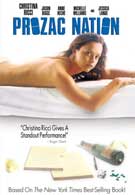Any mind-numbing summer blockbuster season is a great time to see or rent an indie film… especially if it’s a GOOD indie. The most rewarding indies are those you find at the video store, that have completely missed your respective radar, and that you realize are surprisingly excellent once taken home. Erik Skjoldbjærg’s new DVD release Prozac Nation is one of these. This is the movie version of the 1985 autobiography of writer/journalist/proto-feminist/complicated person Elizabeth Wurtzel, taking place during her freshman year at college, where she proceeds to get drunk and coked up, finish some really strong music reviews for Rolling Stone, and just plain be nasty to those around her all the while attempting to get a higher education and battle some severe depression at the same time. An alternate title could’ve been The Effects of Harvard and Drugs in the 1980’s.
It’s these kinds of films that force me to call my little sister at CSULB and make sure she’s doing okay.
During the first few minutes of watching Prozac Nation, I was struck with only one question: what the hell happened to Christina Ricci? Were her pubescent Casper/Addams Family days really so long ago? She disappeared with a mock-sexy grin and a death wail in wet lingerie. Sure, she had a torrid, vampy role in The Opposite of Sex, but that feels worlds away from the Ricci with acting chops featured here. In this film she’s a stew of neuroses, quite simply an offensive, suffering young woman whose talent is overshadowed by the circumference of destruction she surrounds herself with. She’s a bitch, one that we can hate immensely at times but also feel tremendously for in others. Unfortunately, I think we’ve all had friends or girlfriends like Lizzy Wurtzel: a woman who constantly destroys, but whom we can’t stop caring for. Imagine Bridget Jones if, instead of alcohol, mates and Hugh Grant’s buttocks to cling to, she had coke, deadlines, and a contemptibly self-concerned, brittle and overbearing mother in the form of Jessica Lange – you’d probably be a bit screwed up too. It is no exaggeration to say that Ricci’s performance makes the movie. If ever she becomes the recipient of one of those “Lifetime Achievement” awards, the gratuitous montage of clips would primarily feature scenes from this film. Her Lizzy Wurtzel is the role of a lifetime; one that she will be remembered for, mark my words.
This is a film whose characters are swaddled in denial and we are privy to see how that denial causes depression, and the real, unintended effects it has. Just as Lizzy says, she (and it) has no simple solution. The film refuses to sugarcoat (if it were possible to sugarcoat depression) this affliction with miraculous therapists or wonderful drugs. The title refers to a countrywide ingestion of anti-depressants, as an unfortunate, ironic reality. The irony is they are actually helpful, but at the cost of a person’s “true” personality, which begs the question of which is better – a country of relatively happy, sociable monkeys or of intensely screwed-up, naturally isotopic and frail humans?
Surrounding Ricci are some excellent supporting performances. Michelle Williams shines as her compassionate roommate, Jonathan Rhys-Meyers is fantastic in his small role as her deflowerer caught unawares by this female train-wreck, and Jason Biggs (probably the only actor in history whose most memorable co-star was a pastry) needs more meaty roles like this one. Jessica Lange is, as always, Jessica Lange, and a surprisingly good performance is gotten from Anne Heche as Wurtzel’s steely therapist. Surely it stems from personal experience.
There is a long and sordid story behind this film’s controversial release, almost along the lines of the Vincent Gallo/Brown Bunny thing. Well, perhaps it’s not that bad. The movie was set for a 2001 release, when some somewhat insensitive remarks made by Wurtzel about 9/11 pressured Miramax to push its release date further and further back, until the film’s cable release this past March. The film has yet to be reviewed by most of the nation’s media, and those who have written about it have generally panned it. Wurtzel herself has expressed extreme dissatisfaction with the final product, although its been reported that she wept watching its initial screening.
Despite all the negative press, Prozac Nation truly is an excellent film. Skjoldbjærg, responsible for 1998’s incredible Insomnia (the original, not the crappy one) continues to set his standards high. This DVD redefines the term “bare bones” in terms of extras. The only extra is a twenty-minute featurette from the Sundance Channel’s “Anatomy of a Scene” series, which I can only assume debuted when the film was in its promotional stage for its theatrical release. I’ve never seen this series, but its functionality seems threefold: one, to advertise the film by showing a powerful, short scene; two, it makes for an excellent making-of featurette for the eventual home video release; three, it gives an in-depth look at all the minor details which go into a short scene.
The scene in question takes place after Lizzy’s breakdown at the birthday party her mother organizes for her, in which her grandparents are the only attendees. The scene is one of the film’s more important turning points; a fight between she and her mother, where Lizzy finally shares her intense self-loathing and shame for her behavior.
The short featurette goes into the many aspects of this scene, from the screenwriting to the specific cinematography. The most interesting and surprising detail revealed is in the design of the scene, where the filmmakers drew inspiration from particularly the artwork of Edward Munch and its suppressed, muted colors for the film’s color scheme. It’s short and sweet tutorials like this that would’ve probably made my film school education much simpler.
Unfortunately that’s it, in terms of special features. For a film like this, one that was made with so much passion by Skjoldbjærg, produced and acted with such fervor by Ricci, and written by such an antagonistic, profound author like Wurtzel, you'd think someone would’ve put up the money for some commentary. Alas, we’ll probably have to wait for the Triple Crown, Special Limited Director’s Edition. It really doesn’t matter though, as Prozac Nation is still a very worthwhile viewing.
A Hunger Games: Sunrise On The Reaping Character With Deep Ties With Katniss Has Just Been Cast, And I Think They Found The Perfect Person
Netflix's Ted Sarandos Is Hoping For A Trillion Dollar Valuation (And I Already See The Price Hikes Coming)
Shazam's Director Opens Up About 'Death Threats' And Why He's Tried Avoiding Big IPs After The DC Franchise











